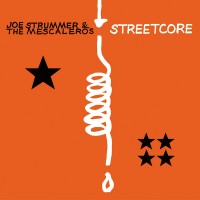"I hear punks talk of anarchy - I hear hobos on the railroad
I hear mutterings on the chain-gangs. It was those men who built the roads.
and if you put it all together and you didn't even once relent
You cast a long shadow - and that is your testament
Somewhere in my soul there's always Rock and Roll."
- Joe Strummer's "Long Shadow" written with Smokey Hormel for Johnny
Cash
I was worried about having to write this review. I suspected I would use
whatever was released as Joe's final work to beatify him, regardless of the
actual quality of the album. Thankfully I can say that, as objective as a
devoted fan can be, Streetcore is more than a worthy closing chapter
on Mr. Joe Strummer's career. I'm relieved I won't have to take on the daunting
task of eulogizing this father of our genre either, as he did it quite well
himself in the above quoted "Long Shadow."
Streetcore's far more stripped back then 2001's Global A Go-Go,
which was a wonderful mess of world music influences and genre bending instrumentation
set against nearly nonsensical stream-of-consciousness lyrics. In many ways
Streetcore, with it's roots rock feel, is closer aligned with `99's
Rock Art & The X-Ray Style. Unlike Rock Art however,
Streetcore benefits from the loving production of Mescaleros Martin
Slattery & Scott Shields. The duo, also Joe's guitarist and bassist,
turned what was likely a mess of demos and unfinished work into an incredibly
coherent and moving record.
The single "Coma Girl" is a perfect example of the Mescalero's
amped folk sound. The band revisits the dub / reggae of "Tony Adams"
with the powerful "Get Down Moses." There's a great dynamic
of loud, fast rockers and emotional country / blues on Streetcore.
Some of Strummer's most charging rock'n'roll in twenty years
are featured here, including "Arms Aloft" and "All In A
Day." The latter, recorded with electronica producer Danny Saber, is
Strummer's most successful and seamless experiment with electronic music.
On the other hand the acoustic roots rock of "Long Shadow" and
the moving cover of Bob Marley âs "Redemption Song" give
Strummer's voice a fitting showcase at the end of his career.
"Redemption Song" is the second cut, along with "Long Shadow,"
that was recorded apart from the Mescaleros. Guesting on it is guitarist Smokey
Hormel (Tom Waits, Beck, Johnny Cash), organist Benmont Tench (Tom Petty &
The Heartbreakers) and producer Rick Rubin on piano. It's a fitting tribute
from one idol to another and the emotional core of the album.
I have a hard time describing the beautiful "Ramshackle Day Parade,"
pure Strummer poetry that hinges on the haunting background vocals of its
chorus. "Burnin' Streets" tastefully reiterates lyrical
themes from The Clash's "London's Burning" over slow
dub/rock. "Midnight Jam" was one of the instrumental tracks recorded
in the studio that likely had no suitable vocals tracked before Joe's
death. Shields and Slatterly salvaged it by weaving vocal samples from Strummer's
BBC Radio Show "London Calling" cleverly into the mix. The album
concludes with "Silver and Gold," a cover of Bobby Charles'
light-hearted classic "Before I Grow Too Old." The circumstances
surrounding this release give it an entirely different feel then Joe intended
at the time. This is the last track on the last album by a man whose influence
has permeated nearly everything that's followed.
"Silver and Gold" ends a pause and a vocal clip of Strummer in
the studio saying "OK, that's a take."
â¦
On Streetcore Joe Strummer and his Mescaleros truly came together
as a band and wrote a batch of amazing songs. This is the real success of
this record, not that it ends Joe's career on a positive note, but that
totally isolated from that context it holds up perfectly. I'm glad I
can say without caution or reservation that this is the best record Strummer
has been involved with since London Calling in 1979.
